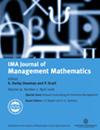包裹递送业务中的位置灵活性:框架与实证分析
IF 4.3
3区 工程技术
Q3 MANAGEMENT
引用次数: 1
摘要
在传统的包裹递送业务中,客户决定递送位置,从而决定运输商的性能。我们利用了这一理念,并表明客户可以通过为运输商提供选择交货地点的灵活性来提高运输商的效率。提出并评估了实现这种灵活性的两种可能的策略。第一种策略在概念上类似于漫游车辆路由,与替代位置的存在有关。第二个策略与聚合/跳过某些位置的可能性有关。我们证明了这两种策略背后的路线优化可以通过众所周知的广义旅行商问题来建模。对真实的包裹递送数据进行了广泛的计算实验,以评估所提出的政策的潜力,并获得在日常实践中可能实施的见解。实验表明,在某些条件下,两种建议的策略可以使路线长度提高15%至20%,在极端但现实的情况下,可以提高40%至50%。因此,灵活交货地点的概念有可能付诸实践,特别是在人口稠密地区。本文章由计算机程序翻译,如有差异,请以英文原文为准。
Location flexibility in parcel delivery operations: framework and empirical analysis
In traditional parcel delivery operations, customers determine delivery locations and, hence, the performance of a transporter. We exploit this idea and show that customers can improve the efficiency of a transporter by giving the latter flexibility in choosing the delivery locations. Two possible policies to enable this flexibility are presented and evaluated. The first policy, conceptually similar to roaming vehicle routing, is related to the presence of alternative locations. The second policy is related to the possibility of aggregating/skipping some locations. We show that route optimization behind both policies can be modelled via the well-known generalized travelling salesman problem. Extensive computational experiments with real parcel delivery data are performed to evaluate the potential of the presented policies and to obtain insights for possible implementation in daily practice. The experiments show that under certain conditions, the two proposed policies can lead to 15 to 20% improvement in the route length and in extreme yet realistic cases up to 40 to 50%. Consequently, the concept of flexible delivery locations has potential for practice, especially in densely populated areas.
求助全文
通过发布文献求助,成功后即可免费获取论文全文。
去求助
来源期刊

IMA Journal of Management Mathematics
OPERATIONS RESEARCH & MANAGEMENT SCIENCE-MATHEMATICS, INTERDISCIPLINARY APPLICATIONS
CiteScore
4.70
自引率
17.60%
发文量
15
审稿时长
>12 weeks
期刊介绍:
The mission of this quarterly journal is to publish mathematical research of the highest quality, impact and relevance that can be directly utilised or have demonstrable potential to be employed by managers in profit, not-for-profit, third party and governmental/public organisations to improve their practices. Thus the research must be quantitative and of the highest quality if it is to be published in the journal. Furthermore, the outcome of the research must be ultimately useful for managers. The journal also publishes novel meta-analyses of the literature, reviews of the "state-of-the art" in a manner that provides new insight, and genuine applications of mathematics to real-world problems in the form of case studies. The journal welcomes papers dealing with topics in Operational Research and Management Science, Operations Management, Decision Sciences, Transportation Science, Marketing Science, Analytics, and Financial and Risk Modelling.
 求助内容:
求助内容: 应助结果提醒方式:
应助结果提醒方式:


